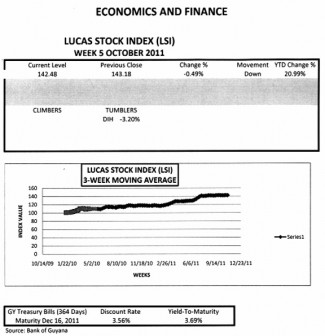Source of Concern
The condition of the sugar industry continues to be a source of concern to many Guyanese. In its budget presentation to the country this year, the administration blamed bad weather, complicated industrial relations and managerial inefficiency and ineffectiveness for the continued poor performance of the sugar industry. The unflattering situation of the industry is the object of political interest given the plight of sugar workers and the role that the administration’s candidate might have played in the declining condition of the industry. It is not clear as to how much of the G$4.3 billion allocated in the 2011 budget has been spent already on attempts to rehabilitate the sugar industry, but problems down the supply chain reveal that the government-controlled corporation remains in trouble.
Increasing Delays
Ships that come to collect sugar are encountering increasing delays and the misalignment between the production and loading points is causing GUYSUCO to incur heavy costs at the expense of its workers and the Guyana economy as a whole. GUYSUCO is giving up as much asG$2 million per day frequently as it struggles to fill ships that come to carry its exports of sugar abroad. The losses which represent demurrage on account of the company’s inability to have the sugar in sufficient quantities to load the ships is obviously hurting the industry and its workers who remain in an uneasy relationship with management.

The incurrence of demurrage charges has been repeating itself quite frequently according to sources familiar with the situation. The difficulties experienced by GUYSUCO stem in part from its inability to produce the quantity of sugar consistent with the level of export demand and the carrying capacity of the ships hired to transport the cargo. This capacity gap is another reflection of the inability of GUYSUCO’s management to correct the labour and supply-chain problems afflicting the industry and which calls into question once again the handling of operations at the Skeldon Sugar Factory.
Intriguing
The 2011 Half Year Report of the Bank of Guyana indicates that production reached 106 thousand tonnes in the first half of the year and current projections are for the industry to reach 298,000 tonnes for the year. There is nothing in the public data to corroborate that projection since the production statistics of sugar which are usually published by the Bureau of Statistics are not part of its current online offerings on production. In addition, the Commodity Market Update for the third quarter that is usually prepared by the Ministry of Agriculture is yet to be published. Even more intriguing is that the second quarter commodity report of the Ministry of Agriculture does not update sugar production and exports to June 2011, leaving one to wonder what the true situation is.
Decline
The March export data leave readers with the impression that the industry has more problems than meet the eye. With 91 percent of production being exported, GUYSUCO shipped about 16,000 tonnes of sugar per month over the last three years. That works out to about 8,000 tonnes per shipment linked to a reported output of 221,000 tonnes. Despite the claim that sugar production should exceed last year’s output, March’s data reveal an average shipment of 6,000 tonnes, or a decline of 25 percent against the average of the last three years. Despite the lower average, in most instances, it takes as many as 15 days per month to load the required export tonnage on ships, forcing the company to incur the higher cost for transporting its cargo.
Change
The Presidential candidate of the PPP/C is linked to the management of GUYSUCO and the government-controlled corporation has not done well under his stewardship. While not identifying him as part of the problem, senior members of the administration have called for changes and improvements in the management of the sugar industry. Those advocating change have not been limited in their thinking and contend, as part of their reasoning, that the skills to manage the sugar industry, especially the operations at Skeldon, do not reside in Guyana. Consequently, there is a desire on their part to outsource the responsibility for the management of GUYSUCO to a foreign company.
Advocacy
The advocacy of this position and its reasons can have serious ramifications at the polls for Mr. Ramotar since he is easily identified with the failed management of GUYSUCO, and the declining strength of the sugar industry. This of course calls into question his readiness to take on a more complex and challenging assignment as running the affairs of Guyana where the permutation and combination of problems are not confined to the domestic arena or one industry or sector of the economy. The often complex relationship between domestic and foreign policy goes beyond the deplorable drainage of the city and countryside, the erratic construction of edifices in breach of zoning laws and safety regulations, the growing number of destitute on the road, declining real income and security for the majority of workers, among other ills of the society.
The condition of the sugar industry is no good example of competent leadership as all Guyanese agree, including those sponsoring the PPP/C candidate. However, it is not always good to take an isolated incident and generalize. As such, it is reasonable to inquire what else is known about this candidate that should make people repose confidence in him.





